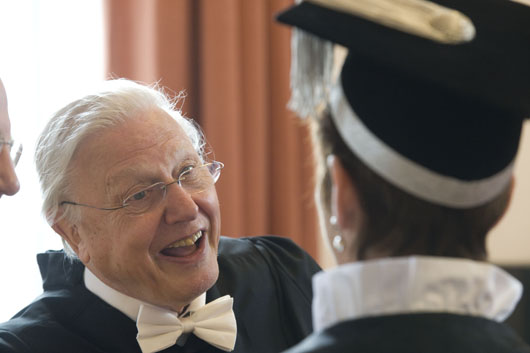Laureation address – Sir David Attenborough
Sir David Attenborough
Honorary Degree of Doctor of Science
Laureation by Professor David Paterson
School of Biology
Wednesday 22 June 2011

Vice-Chancellor, it is my privilege to present Sir David Attenborough for the degree of Doctor of Science, honoris causa.
Almost anyone who works with nature or has a passion for the natural world has had a moment of revelation. The beauty of a landscape, the behaviour of a rare species, or the stunning colour of a coral reef. For some, this experience may form the cornerstone of a career or passion that lasts a lifetime. Sir David Attenborough has seen more of the natural world than most. So what inspired him, as he embarked on his first film-making venture to the tropics. Driver ants, bush babies or exotic bird-eating spiders? No, he stumbled into a hedge. Not too exciting for a man who has hugged wild gorillas, been charged by a rhino and filmed a ceolocanth? But being West Africa, the hedge was comprised of Mimosa, “the sensitive plant”, whose leaves collapsed on contact like a folding umbrella! To Sir David, this was an inspiration and “a revelation of the glory and fecundity of tropical nature”. I like this story, because it shows that it is not only the charismatic species that can provide inspiration. Further, despite his great achievements, Sir David is a modest man and for one of our greatest advocates of natural history to be inspired by a hedge seems somehow fitting. Sir David has since devoted his career to bringing the wonders of nature, common and exotic, from across the globe into our lives.
So was Sir David’s progress from a hedge in West Africa to his position today a smooth one? No, Sir David has taken many risks but always to move closer to what he really wanted to do. He resigned his first job as a publisher, which he found boring, for an uncertain trial in the new medium of television. This career nearly ended before it began. After his first on-air interview he was rejected for this role in future by the BBC with the note:
David Attenborough is intelligent and promising and may well be producer material, but he is not to be used as an interviewer again. His teeth are too big!
Despite this setback, Sir David set about producing innovative material under the newly formed “Talks Department” of the BBC. He applied an enviable power of persuasion to fulfil his obsessions with travel and with wildlife and cultural documentation. The BBC was finally convinced to risk this new approach but the technology was limiting. The first cameras used by Sir David’s team filmed in black and white, were clockwork, and ran for only 40 seconds before needing to be rewound. Despite this, he managed to produce the highly successful “Zoo Quest” series, an early precursor to modern wildlife documentaries. However, he resigned once again to pursue a further academic degree but was called back to take over as Programme Controller for the recently established, but failing, BBC2 network. He excelled at this and promoted programmes such as Horizon, Civilisation, Monty Python’s Flying Circus and Pot Black. The latter only possible because it was under Sir David that colour was introduced to television, snooker in black and white is not a huge attraction!
After turning around BBC2, he was promoted again, to Director of Programmes for the BBC. While a successful and effective administrator, it is clear that his heart was in the programmes that were created and not in the management of the structures. He had an agreement that he could escape his desk periodically to make programmes, and help retain his sanity. It is not surprising that after 8 years as an administrator, he once again resigned and returned to film-making and production as a freelance agent. Understandably nervous of this move, losing a guaranteed salary, he need not have worried. Work flowed in and he made the series of programmes that solidified his world-wide reputation. The list of these would take the entire laureation, but you know them already: Life on Earth, The Living Planet and Life in Cold Blood and many more. These series, and related books, bring nature to us in a way that would have seemed impossible when David Attenborough first started filming. In his autobiography he says “I see myself as a story teller.” Yes, Sir David Attenborough is a story teller, but a story teller in the way that Pele was a footballer or that Mozart could compose a fair tune.
One last things for our graduands to note; it may seem impossible to aspire to a career like David Attenborough’s but remember Sir David resigned a secure job and “went into television and particularly natural history because it was fun. Happily (he said), the way we enjoyed ourselves proved to be not without merit as far as the rest of the world is concerned.” Typically, a huge understatement, but the message is clear, I think his advice to you would be take the risk to devote yourself to what you enjoy!
Sir David Attenborough has brought us a view of nature that enriches people of all ages and helps to instil the respect for the natural world that is critically needed in the present day and so, Vice- Chancellor, in recognition of his major contribution as a “story teller”, illuminating the natural world to all, I invite you to confer on Sir David Attenborough the degree of Doctor of Science, honoris causa.
Category Awards